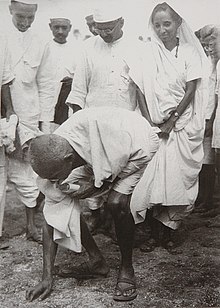Salt Marsh

The Salt March or Salt Satyagraha of 1930 was a campaign by Mahatma Gandhi to break the British monopoly on salt and ultimately lead to India's independence from Great Britain . The Salt March was the most spectacular campaign that Gandhi initiated during his struggle for independence . This action was intended to encourage civil disobedience and send a signal against Britain's dependence on excessive taxes .
On March 12, 1930, Gandhi and 78 of his followers moved from their place of residence Sabarmati-Ashram near Ahmedabad over 385 kilometers to Dandi on the Arabian Sea . He arrived there 24 days later and picked up a few grains of salt as a symbolic act to demonstrate against the British salt monopoly. Salt has always been an important economic factor in India and also necessary for the population, on the one hand to prepare the staple food rice and on the other hand to compensate for the daily loss of electrolytes in the hot climate . Gandhi urged his compatriots to do the same, renouncing violence, which was happening all over India: Not only did his followers begin to extract their own salt by placing salt water in a bowl in the sun and allowing it to evaporate, but also other Indians participated. In addition, they not only used the extracted salt for private purposes, but also resold it tax-free.
Because every form of salt production , salt transport and salt trade was reserved for the British, around 50,000 Indians were arrested in the episode, including almost all leaders of the Congress Party of India, which accelerated the success of the action extraordinarily.
